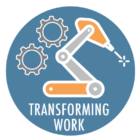
The hospitality industry is characterized by lots of low-wage workers. E. Tammy Kim, in a New York Times column entitled The Gig Economy is Coming For Your Job, writes about how technology is allowing the hospitality industry to use gig workers to increase the number of low-wage workers. She writes:
… The doormen and bellmen who once summoned cabs for guests, and were tipped in return, now watch lines of Ubers and Lyfts coil in front of the lobby doors, while concierges have had their work outsourced to iPad consoles. Some hotels offer tablets in every room preloaded with food-delivery apps, and give guests vouchers for Uber and Lyft rides. In the
microcosm of the hotel, the app economy has expanded choices for some (the guests) and shrunk options for others (the workers).
These currents in hospitality represent a subtle, sneaky form of technological displacement, care of the gig economy. They’re not robots stepping in for humans on a factory floor, but rather smartphone-based independent contractors and supplemental “cobots” (a portmanteau of “co-worker” and “robot”) chipping away at the careers of full-time and in some cases unionized employees.
In the beginning of the gig economy, people most feared one-to-one
job loss: An Uber driver comes in, a taxi driver goes out. And taxi drivers have indeed lost their livelihoods — and taken their own lives. Yet many app workers are only part-time, driving or TaskRabbit-ing to supplement their wages in a traditional job.App companies, for their part, deny that even full-timers are employees, perpetuating the fantasy that gig workers are solo entrepreneurs. It’s a business model that reduces everything to a series of app-enabled transactions, and calls it work, leaving what’s left of the welfare state to fill in the rest.
Aaron Benanav, a labor historian at the University of Chicago, explains that this process of “de-skilling” and misclassification is happening all over the world. The gig economy “is being used to replace skilled workers with less skilled, or continuing a process that’s happening all over the world of ‘disguised employment,’ where you bring in independent contractors to replace employees,” he said. “There’s an app for that” means that there’s less steady, reliable work for traditional employees.
Consumers seem to prefer the service provided by even lower-wage gig workers and companies have an enormous incentive to lower wages and benefits and will use their political clout to enable them to do so. The consequence is an already low-wage-predominant hospitality industry moving in the direction of having an even higher proportion of low-wage workers.
As we have written frequently the preeminent economic challenge of our times is having an economy as it grows, benefits all. For the past several decades the trend is in the opposite direction. With the prime reason being the economy is producing too many low-wage jobs.
Technology is one of the culprits in creating an economy that is mainly benefiting those at the top. Although the top is far larger than the one percent.
But another reason for an economy that is leaving far too many struggling even when the economy is hitting on all cylinders is the policy choices we have made over the last forty years. Choosing to tilt the playing field towards capital and away from labor.
Seattle venture capitalist Nick Hanauer as we have explored previously, has proposed a shared security system. His is a serious proposal to deal with the Great Decoupling. Where technology exacerbates the trend that as the economy grows, it leaves a substantial proportion of American households unable to earn enough to pay the bills, save for their retirements and for the kids’ education. Hanauer is trying to figure out how we can get the benefits of technology and have a broad middle class. Rather than having to choose one or the other.
He and his co-author David Rolf write:
We propose a new Shared Security System that endows every American
worker with, first, a “Shared Security Account” in which to accrue the basic employment benefits necessary for a thriving middle class, and second, a new set of “Shared Security Standards” that complement and reinforce that account.One can think of the Shared Security Account as analogous to Social Security, but encompassing all of the employment benefits traditionally provided by a full-time salaried job. Shared Security benefits would be earned and accrued via automatic payroll deductions, regardless of the employment relationship, and, like Social Security, these benefits would be fully prorated, portable, and universal.
… Within the context of the Shared Security Account, there would be essentially two types of benefits: those that are accrued over time, retaining a specific dollar value, and those that provide insurance against life events, foreseen or otherwise. And the two types of benefits would be accounted for differently.
Mandatory accrued benefits should include a minimum of five days a year of paid sick leave, 15 days a year of paid vacation leave, a matching 401(k) contribution, and the same health insurance premium contribution as currently required under the Affordable Care Act (ideally, health care would fall into the insurance benefit category, but that is a larger battle). Employers—that is to say, whatever entity is paying the worker—would be required to contribute to the worker’s Shared Security Account with each paycheck, with the contributions prorated based on a standard eight-hour day, 40-hour week, and 2,080-hour year.
… Mandatory insurance benefits should include unemployment, workers’ compensation, and paid maternity, paternity, family, and medical leave.
Their Shared Security Standards include all employers providing paid leave; a $15 an hour minimum wage; overtime pay for the same 65 percent of salaried workers who were covered in 1975; gender pay equity; and fair scheduling.
What we most need now is for those who don’t like the approach that Hanauer and Rolf take to lay out their alternative for how you have a capitalism that works for all. And have a debate about which of the approaches will work best in meeting the goal of an economy that works for all. What should be off the table is just accepting the Great Decoupling.







